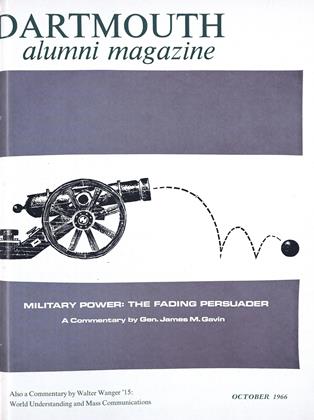RICHARD P. REID '43 left Dartmouth in the middle of his junior year to join Carlson's Raiders, a Marine outfit with the glamour of the Green Berets. Friends sold him on the Air Corps instead, and lacking the physical requirements for pilot, he became an engineer-gunner on B-17 Flying Fortresses.
Today, known as Dom Benedict Reid, he is superior of St. Gregory's Priory in Three Rivers, Michigan, and as such is head of the only Anglican Benedictine monastery in the United States.
"I was especially depressed in the Army by the lack of intelligent exchange between those in command and the average soldier. This seemed to be symbolic of life in the world- thus emphasizing my search for a more meaningful life."
He became a monk in 1948, a priest in 1952, and - after brief assignments as guest master and novice master- was named superior or Father Prior at 34.
Father Reid's day of work and prayer starts with Matins at 4:00 a.m. Lights go out at 9:30 p.m.
"The first function of the monastery is prayer - liturgical and private. But of the works we undertake to serve the needs of the people in the world, retreats are one of the most important."
He has established a summer program he calls a "spiritual vocation corps." A person in the Episcopal Church can live at the monastery according to the same rules and time schedule as the monastic members. This gives many an insight into the contemplative life and helps others in clarifying their own vocation in the Church.
The monks raise beef cattle on the monastery's 500 acres, as well as Christmas trees. But they also depend on donations.
"There are signs," he says, "that the area surrounding the Priory may develop -somewhat as the surrounding areas did in medieval times - into a Christian cooperative with farmers, artists, craftsmen, etc. bringing their lives into a quieter harmony with nature and Christian principles.
"I don't think the religious life superior to other vocations, but for me this was the most attractive vocation."
He describes himself as having a natural bent for interior reflection and generalized thinking which gives him a large vision of God's working in history.
"I have always felt that my choice was essentially a free decision. This sense of freedom gains in intensity as one grows in the knowledge that by God's grace one can cooperate even in some small way in accomplishing His will for the whole world."
 View Full Issue
View Full Issue
More From This Issue
-
 Feature
FeatureMILITARY POWER: THE FADING PERSUADER
October 1966 By LIEUTENANT GENERAL JAMES M. GAVIN -
 Feature
FeatureWORLD UNDERSTANDING: A Job for Mass Communications
October 1966 By WALTER WANGER '15 -
 Feature
FeatureUnderstatement: A Busy Summer
October 1966 -
 Feature
FeatureA Landmark Goes Down
October 1966 -
 Feature
FeatureBoat Rocker
October 1966 -
 Feature
FeaturePress Secretary
October 1966
Features
-
 Feature
FeatureA Cultural Look Ahead
MAY 1957 -
 Feature
FeatureAlumni Awards
JULY 1973 -
 Feature
FeatureYAHOOEY!
Nov/Dec 2000 -
 Feature
FeatureAmazing
May/June 2004 By Cynthia-Marie O'Brien '04, CHRISTOPHER BERG '89 -
 Feature
FeaturePushing the Envelope
May 1998 By Fritz Hier '44 -
 Feature
FeatureBob Graham '40, Newsman
JUNE/JULY 1984 By Howard Coffin

